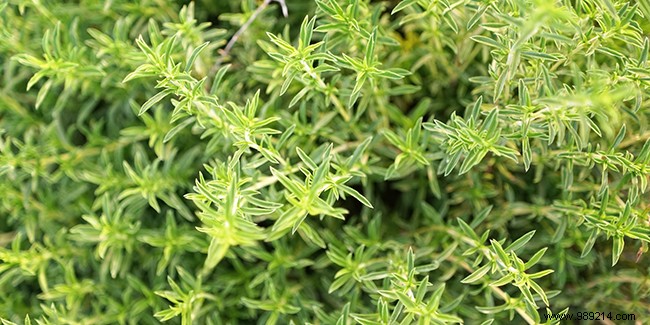
Savory is an aromatic plant native to the shores of the Mediterranean basin, but also to the Near East, Asia-Minor and Central Europe. This herb is used like thyme and rosemary. There are two species, one of which is perennial. It is nicknamed the mountain savory and the other is the common savory or garden savory. It grows easily on calcareous, light and well-drained soils in the sun. Savory is one of the herbs of Provence, but it can also be used in natural medicine for its therapeutic virtues.
Savory's scientific name is Satureja hortensis which means "satyr grass". This aromatic plant has been known since antiquity. The Romans and Greeks already used it to season dishes, but also as an aphrodisiac. It was therefore baptized plant of happiness or plant of the devil according to the people. For this reason, later, the Benedictine monks were forbidden to consume it. Savory is also nicknamed sadrée, donkey pepper, Saint-Julien herb or even savory. Its taste is reminiscent of thyme and mint.
Savory is often found in Provence, between lavender plants. The plant reaches 30-40 cm. Its flowers are white to mauve and open between July and September. The stems are covered with small downy hairs.
Savory has several interesting characteristics thanks to:
4 grams of dried savory contain only 12kcal and 2g of dietary fibre, with 3.1g of carbohydrates, 0.3g of fat and 0.3g of protein.
Savory contains iron, and while it is sufficient for the man, it is not high enough for the needs of the woman. Iron, remember, is used to transport oxygen in the blood and it is also necessary for the formation of red blood cells, neurotransmitters and hormones.
Calcium is in significant quantity in the savory. It helps in the formation of bones, teeth and also keeps them healthy. Its role is essential for coagulation, muscle contraction like that of the heart and the proper maintenance of blood pressure.
The manganese contained in the savory is necessary for the woman. It helps prevent damage caused by free radicals and remains an important cofactor for several enzymes.
Women need magnesium and that contained in savory is significant for bone formation, dental health, the immune system, proteins while playing an important role in energy metabolism and nerve impulses.
In savory, there is also vitamin B6 which is also called pyridoxine. It contributes to the metabolism of proteins, fatty acids, to the production of neurotransmitters and also helps to produce red blood cells. This vitamin B6 is still essential to help in the transformation of glucogen as well as in certain cells.
Thanks to all the components it contains, savory is a plant known for many therapeutic virtues such as:
Savory is both antiseptic and antiviral. It is therefore interesting to consume it during sore throats, colds, occasional fatigue.
The savory would have an anti-carcinogenic potential on certain cells in particular on those of the liver. This aromatic herb would also inhibit an HIV-1 integrase enzyme. It would also have anti-diabetic and anti-cholesterolemic powers.
To make a savory-based herbal tea, pour 50 grams of the flowering tops of the plant into a liter of boiling water. Then let it steep for ten minutes and drink three cups of the herbal tea a day during a cough, sore throat or rhinitis. People with digestive problems can add savory to the cooking water for chickpeas, lentils, beans, etc. it must be added at the end of cooking to preserve its freshness and flavor.
Savory can be stored for one to two weeks in a damp cloth in the vegetable drawer of the refrigerator. It is also possible to cut it into small pieces, and freeze it in an ice cube tray. To dehydrate it, hang it in a dry, warm place in a dark or dark room or dry it in the oven at a low temperature. It will then be kept in an opaque and terracotta or glass jar.
There are practically no contraindications for consuming savory except in anticoagulant treatments or it is better to ask your doctor, because the plant is rich in vitamin K.
Savory herbal tea tastes very good. It is possible to drink it from time to time just to warm up in winter or to relax after a long day of work. It can be eaten like this or with a little honey in case of a mild seasonal cold.